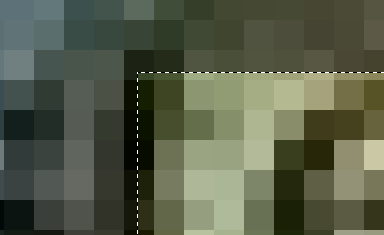| GtkImageView Reference Manual | ||||
|---|---|---|---|---|
| Top | Description | Object Hierarchy | Implemented Interfaces | Properties | Signals | ||||
GtkImageToolSelectorGtkImageToolSelector — Image tool for selecting rectangular regions  Screenshot showing a GtkImageToolSelector with an
active selection on a GtkImageView
|
Synopsis
enum HotspotType; GtkImageToolSelector; GtkIImageTool * gtk_image_tool_selector_new (GtkImageView *view); void gtk_image_tool_selector_get_selection (GtkImageToolSelector *selector, GdkRectangle *rect); void gtk_image_tool_selector_set_selection (GtkImageToolSelector *selector, GdkRectangle *rect);
Description
GtkImageToolSelector is a tool for selecting areas of an image. It
is useful for cropping an image, for example. The tool is an
implementor of the GtkIImageTool inteface which means that it can
be plugged into a GtkImageView by using the
gtk_image_view_set_tool() method.
GtkImageToolSelector changes the default display of the GtkImageView. It darkens down the unselected region of the image which provides a nice effect and makes it clearer what part of the image that is currently selected. Unfortunately, this effect is somewhat incompatible with how GtkImageNav behaves because that widget will show the image without darkening it.
The tool also changes the default behaviour of the mouse. When a GtkImageToolSelector is set on a GtkImageView, mouse presses do not "grab" the image and you cannot scroll by dragging. Instead mouse presses and dragging is used to resize and move the selection rectangle. When the mouse drags the selection rectangle to the border of the widget, the view autoscrolls which is a convenient way for a user to position the selection.
Please note that GtkImageToolSelector draws the image in two
layers. One darkened and the selection rectangle in normal
luminosity. Because it uses two draw operations instead one one like
GtkImageToolDragger does, it is significantly slower than that
tool. Therefore, it makes sense for a user of this library to set
the interpolation to GDK_INTERP_NEAREST when using this tool to
ensure that performance is acceptable to the users of the program.
Zoom bug
There is a small bug in GtkImageToolSelector that becomes apparent when the zoom factor is greater than about 30. The edge of the selection rectangle may in that case intersect a pixel:

The bug is caused by bug 389832 in gdk-pixbuf. There is no way to solve this bug on GtkImageView's level (but if someone knows how, I'd really like to know).
Details
enum HotspotType
typedef enum
{
HOTSPOT_INSIDE = 0,
HOTSPOT_RESIZE_NORTH_WEST,
HOTSPOT_RESIZE_NORTH_EAST,
HOTSPOT_RESIZE_SOUTH_WEST,
HOTSPOT_RESIZE_SOUTH_EAST,
HOTSPOT_RESIZE_NORTH,
HOTSPOT_RESIZE_EAST,
HOTSPOT_RESIZE_SOUTH,
HOTSPOT_RESIZE_WEST,
HOTSPOT_OUTSIDE,
HOTSPOT_LAST
} HotspotType;
gtk_image_tool_selector_new ()
GtkIImageTool * gtk_image_tool_selector_new (GtkImageView *view);
Creates a new selector tool for the specified view with default values. The default values are:
- selection : (0, 0) - [0, 0]
|
a GtkImageView |
Returns : |
a new GtkImageToolSelector |
gtk_image_tool_selector_get_selection ()
void gtk_image_tool_selector_get_selection
(GtkImageToolSelector *selector,
GdkRectangle *rect);
Fills in rect with the current selection rectangle. If either the
width or the height of rect is zero, then nothing is selected and
the selection should be considered inactive. See
"selection-changed" for an example.
|
a GtkImageToolSelector |
|
a GdkRectangle to fill in with the current selection rectangle. |
gtk_image_tool_selector_set_selection ()
void gtk_image_tool_selector_set_selection
(GtkImageToolSelector *selector,
GdkRectangle *rect);
Sets the selection rectangle for the tool. Setting this attribute will cause the widget to immediately repaint itself if its view is realized.
This method does nothing under the following circumstances:
- If the views pixbuf is
NULL. - If
rectis wider or taller than the size of the pixbuf - If
rectequals the current selection rectangle.
If the selection falls outside the pixbufs area, its position is moved so that it is within the pixbuf.
Calling this method causes the ::selection-changed signal to be emitted.
The default selection is (0,0) - [0,0].
|
a GtkImageToolSelector |
|
Selection rectangle in image space coordinates. |
Signal Details
The "selection-changed" signal
void user_function (GtkImageToolSelector *selector, gpointer user_data) : Run Last
The ::selection-changed signal is emitted when the selection rectangle on the selector is moved or resized. It is inteded to be used by applications that wants to print status information. For example:
static void
sel_changed_cb (GtkImageToolSelector *selector)
{
GdkRectangle sel;
gtk_image_tool_selector_get_selection (selector, &sel);
if (!sel.width || !sel.height)
printf ("No selection\n");
else
printf ("The selection is %d, %d - %d, %d\n",
sel.x, sel.y, sel.width, sel.height);
}
...
// selector is an already initialized GtkImageToolSelector
// object.
g_signal_connect (G_OBJECT(selector), "selection_changed",
G_CALLBACK (sel_changed_cb), NULL);
|
the selector that emitted the signal. |
|
user data set when the signal handler was connected. |
